Activated Sludge Process
Activated sludge (AS) is a process dealing with the treatment of sewage and industrial wastewaters and developed around 1912-1914. There is a large varity of design, however, in principle all AS consist of three main components: an aeration tank, which serves as bio reactor; a settling tank ("final clarifier") for seperation of AS solids and treated waste water; a return activated sludge (RAS) equipment to transfer settled AS from the clarifier to the influent of the aeration tank.
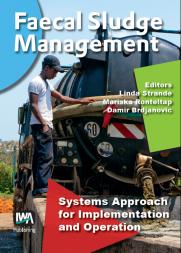 Faecal Sludge Management
Faecal Sludge Management
ISBN: 9781780404721
eISBN: 9781780404738
It is estimated that literally billions of residents in urban and peri-urban areas of Africa, Asia, and Latin America are served by onsite sanitation systems (e.g. various types of latrines and septic tanks). Until recently, the management of faecal sludge from these onsite systems has been grossly neglected, partially as a result of them being considered temporary solutions until sewer-based systems could be implemented. However, the perception of onsite or decentralized sanitation technologies for urban areas is gradually changing, and is increasingly being considered as long-term, sustainable options in urban areas, especially in low- and middle-income countries that lack sewer infrastructures. This is the first book dedicated to faecal sludge management. It compiles the current state of knowledge of the rapidly evolving field of faecal sludge management, and presents an integrated approach that includes technology, management, and planning based on Sandecs 20 years of experience in the field.
Faecal Sludge Management: Systems Approach for Implementation and Operation addresses the organization of the entire faecal sludge management service chain, from the collection and transport of sludge, and the current state of knowledge of treatment options, to the final end use or disposal of treated sludge. The book also presents important factors to consider when evaluating and upscaling new treatment technology options. The book is designed for undergraduate and graduate students, and engineers and practitioners in the field who have some basic knowledge of environmental and/or wastewater engineering.
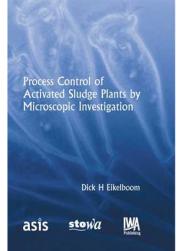 Process Control of Activated Sludge Plants by Microscopic Investigation
Process Control of Activated Sludge Plants by Microscopic Investigation
ISBN: 9781900222297
eISBN: 9781789060003
Process stability and final effluent quality largely depend upon the composition of the biomass in an activated sludge plant. Operational problems such as bulking and scum formation occur when the wrong micro-organisms are dominating the sludge population. Microscopic sludge investigation is therefore essential for process control and stable plant operation. The manual outlines the theoretical framework, extensively illustrated with full-colour micrographs.
Contents: - Microscopy - Microscopic sludge investigation - Characteristics of activated sludge flocs - Filamentous micro-organisms - Protozoa and metazoa - Conclusions of microscopic sludge investigation - The activated sludge process - Operational problems - Bulking sludge - Scum formation.
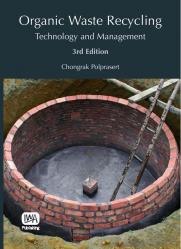 Organic Waste Recycling: Technology and Management – Third Edition
Organic Waste Recycling: Technology and Management – Third Edition
ISBN: 9781843391210
eISBN: 9781780402024
This book covers the principles and practices of technologies for the control of pollution originating from organic wastes (e.g. human faeces and urine, wastewater, solid wastes, animal manure and agro-industrial wastes) and the recycling of these organic wastes into valuable products such as fertilizer, biofuels, algal and fish protein and irrigated crops.
Each recycling technology is described with respect to: - Objectives - Benefits and limitations - Environmental requirements - Design criteria of the process - Use of the recycled products - Public health aspects. Organic Waste Recycling includes case studies, examples, exercises and questions. This book is intended as a text or reference book for third or fourth year undergraduate students interested in environmental science, engineering and management, and graduate students working in the environment-related disciplines. It also serves as a reference text for policy makers, planners and professionals working in the environment and sustainable development fields.
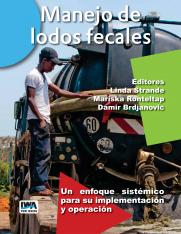 Manejo de Lodos Fecales
Manejo de Lodos Fecales
ISBN: 9781780408019
eISBN: 9781780408026
This book is a Spanish translation of Faecal Sludge Management: Systems Approach for Implementation and Operation.
Más de 1.000 millones de personas en las áreas urbanas y peri-urbanas de África, Asia y América utilizan tecnologías descentralizadas de saneamiento. Hasta ahora se ha descuidado tremendamente el manejo de los lodos fecales producidos por estas tecnologías. Los recursos financieros son frecuentemente insuficientes y estos sistemas descentralizados suelen ser vistos como soluciones temporales, hasta poder implementar sistemas con alcantarillado. Sin embargo, la verdad es que el saneamiento descentralizado está aquí para quedarse, sea como soluciones independientes temporales o permanentes, o en combinación con sistemas basados en el alcantarillado. El manejo adecuado y apropiado de los lodos fecales es primordial para la protección de la salud humana y ambiental. Este es el primer libro dedicado netamente al manejo de lodos fecales. Compila el estado actual de conocimiento en este campo que está evolucionando rápidamente y presenta un enfoque integrado que incluye la tecnología, el manejo y la planificación. Aborda la planificación y organización de toda la cadena de servicios de manejo de lodos fecales, desde su recolección y transporte hasta su tratamiento y uso o disposición final. Además de resumir los fundamentos y tecnologías, el libro también expone los detalles de los aspectos operativos, institucionales y financieros y las pautas para planificar un proyecto para el manejo de lodos fecales con la participación de todos los actores. Editado.
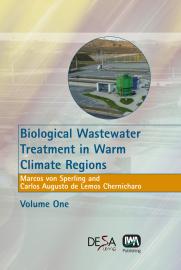 Biological Wastewater Treatment in Warm Climate Regions Volume II
Biological Wastewater Treatment in Warm Climate Regions Volume II
ISBN: 9781843391074
eISBN: 9781780402703
Biological Wastewater Treatment in Warm Climate Regions gives a state-of-the-art presentation of the science and technology of biological wastewater treatment, particularly domestic sewage. The book covers the main treatment processes used worldwide with wastewater treatment in warm climate regions given a particular emphasis where simple, affordable and sustainable solutions are required.
This comprehensive book presents in a clear and informative way the basic principles of biological wastewater treatment, including theory and practice, and covering conception, design and operation. In order to ensure the practical and didactic view of the book, 371 illustrations, 322 summary tables and 117 examples are included. All major wastewater treatment processes are covered by full and interlinked design examples which are built up throughout the book, from the determination of wastewater characteristics, the impact of discharge into rivers and lakes, the design of several wastewater treatment processes and the design of sludge treatment and disposal units. The 55 chapters are divided into 7 parts over two volumes: Volume One: (1) Introduction to wastewater characteristics, treatment and disposal; (2) Basic principles of wastewater treatment; (3) Stabilisation ponds; (4) Anaerobic reactors; Volume Two: (5) Activated sludge; (6) Aerobic biofilm reactors; (7) Sludge treatment and disposal. As well as being an ideal textbook, Biological Wastewater Treatment in Warm Climate Regions is an important reference for practising professionals such as engineers, biologists, chemists and environmental scientists, acting in consulting companies, water authorities and environmental agencies.
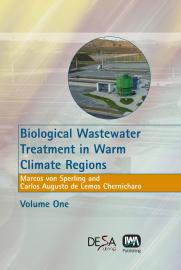 Biological Wastewater Treatment in Warm Climate Regions Volume I
Biological Wastewater Treatment in Warm Climate Regions Volume I
ISBN: 9781843390022
eISBN: 9781780402734
Biological Wastewater Treatment in Warm Climate Regions gives a state-of-the-art presentation of the science and technology of biological wastewater treatment, particularly domestic sewage. The book covers the main treatment processes used worldwide with wastewater treatment in warm climate regions given a particular emphasis where simple, affordable and sustainable solutions are required.
This comprehensive book presents in a clear and informative way the basic principles of biological wastewater treatment, including theory and practice, and covering conception, design and operation. In order to ensure the practical and didactic view of the book, 371 illustrations, 322 summary tables and 117 examples are included. All major wastewater treatment processes are covered by full and interlinked design examples which are built up throughout the book, from the determination of wastewater characteristics, the impact of discharge into rivers and lakes, the design of several wastewater treatment processes and the design of sludge treatment and disposal units. The 55 chapters are divided into 7 parts over two volumes: Volume One: (1) Introduction to wastewater characteristics, treatment and disposal; (2) Basic principles of wastewater treatment; (3) Stabilisation ponds; (4) Anaerobic reactors; Volume Two: (5) Activated sludge; (6) Aerobic biofilm reactors; (7) Sludge treatment and disposal. As well as being an ideal textbook, Biological Wastewater Treatment in Warm Climate Regions is an important reference for practising professionals such as engineers, biologists, chemists and environmental scientists, acting in consulting companies, water authorities and environmental agencies.
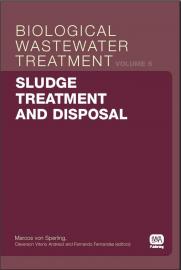 Biological Wastewater Treatment Series (Volume 6): Sludge Treatment and Disposal
Biological Wastewater Treatment Series (Volume 6): Sludge Treatment and Disposal
ISBN: 9781843391661
eISBN: 9781780402130
Sludge Treatment and Disposal is the sixth volume in the series Biological Wastewater Treatment. The book covers in a clear and informative way the sludge characteristics, production, treatment (thickening, dewatering, stabilisation, pathogens removal) and disposal (land application for agricultural purposes, sanitary landfills, landfarming and other methods). Environmental and public health issues are also fully described.
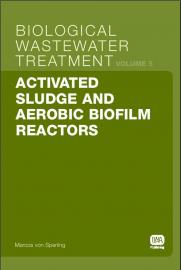 Biological Wastewater Treatment Series (Volume 5): Activated Sludge and Aerobic Biofilm Reactors
Biological Wastewater Treatment Series (Volume 5): Activated Sludge and Aerobic Biofilm Reactors
ISBN: 9781843391654
eISBN: 9781780402123
Activated Sludge and Aerobic Biofilm Reactors is the fifth volume in the series Biological Wastewater Treatment. The first part of the book is devoted to the activated sludge process, covering the removal of organic matter, nitrogen and phosphorus.A detailed analysis of the biological reactor (aeration tank) and the final sedimentation tanks is provided. The second part of the book covers aerobic biofilm reactors, especially trickling filters, rotating biological contractors and submerged aerated biofilters. For all the systems, the book presents in a clear and informative way the main concepts, working principles, expected removal efficiencies, design criteria, design examples, construction aspects and operational guidelines.
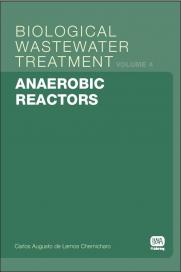 Biological Wastewater Treatment Series (Volume 4): Anaerobic Reactors
Biological Wastewater Treatment Series (Volume 4): Anaerobic Reactors
ISBN: 9781843391647
eISBN: 9781843391647
Anaerobic Reactors is the forth volume in the series Biological Wastewater Treatment. The fundamentals of anaerobic treatment are presented in detail, including its applicability, microbiology, biochemistry and main reactor configurations. Two reactor types are analysed in more detail, namely anaerobic filters and especially UASB (upflow anaerobic sludge blanket) reactors. Particular attention is also devoted to the post-treatment of the effluents from the anaerobic reactors. The book presents in a clear and informative way the main concepts, working principles, expected removal efficiencies, design criteria, design examples, construction aspects and operational guidelines for anaerobic reactors.